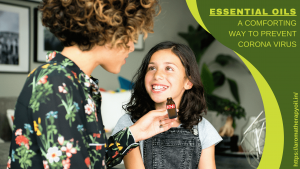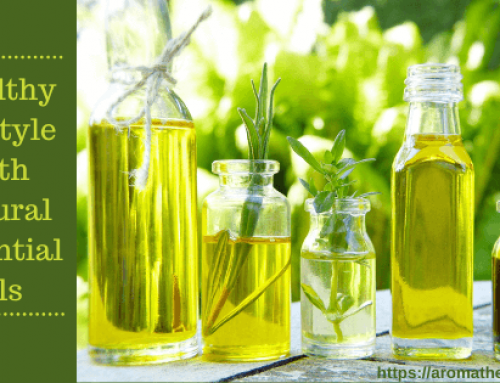
ESSENTIAL OILS – A COMFORTING WAY TO PREVENT CORONAVIRUS
The sudden spread of coronavirus has caused a fearful and painful pause in the lives of people around the globe. The mere thought of stepping out of the house to run a necessary errand makes us cower back in fear of risking our lives as well as our family’s.
Masks appear to be a part of the daily outfits and sanitizers are being bought in a larger quantity than groceries and toiletries. Taking bitter brews, inhaling steam and gargling has become a routine. Some have even resorted to taking ayurvedic and homeopathic medicines for the sole purpose of keeping their immune systems strong.
But what if there is a way that gives you comfort and peace and fights off the dreaded virus simultaneously?
Well, there is a way to prevent coronavirus – ESSENTIAL OILS...

Essential oils are highly concentrated plant extracts distilled into oil. Popular in complementary and alternative medicine, these oils, derived from flowers, leaves, roots, and other parts of plants, have been used for medicinal purposes in some cultures for centuries.
Most of us relate essential oils with fragrances and aromatherapy. They have always proved to be useful when one needs to find peace and relax the mind.
But there are many more beneficial properties associated with essential oils that help with the building of the immunity system (to fight coronavirus or any other virus), such as:
1. Antibacterial
2. Antiviral
3. Antiseptic
4. Anti-inflammatory
5. Antifungal
6. Stress relief
7. Sleep encouraging
It has been very well proved that stress, anxiety, and lack of sleep play significant roles in undermining the immunity system. Essential oils play a part in alleviating all these problems, thus promoting well-being.
ESSENTIAL OILS USED AS IMMUNO MODULATORS
1. Eucalyptus: Eucalyptus has been used for a long time for curing a cold and flu by providing relief from congestion. Its compound called 1,8-cineole has powerful anti-inflammatory, antioxidant, and antibacterial properties.
2. Turmeric: Turmeric is a common spice in India with extensive medicinal applications for ages. Curcumin, one of the major active compounds of turmeric, has an immune-boosting ability. Literature supported that curcumin helps to activate various defense mechanism cells of the body and suppresses pro-inflammatory cytokines. Curcumin can enhance an antibody response and regulates gut microbiome
3. Ginger: This spicy plant is acclaimed for its aid in nausea. Ginger contains several active chemical constituents that are effective against a common cold-causing virus
4. Black Pepper: Pepper reported to has considerable antimicrobial properties, hence effective against the common cold. Including it in your daily diet will help to improve immunity and aids in getting rid of various respiratory illnesses.
5. Cumin: Cumin is a rich source of iron. It is full of antioxidants and has been shown to exhibit anti-microbial and anti-inflammatory activity. Studies revealed that cumin helps with digestion and prevent food-borne infections.
6. Garlic: Garlic can be used effectively for the prevention and treatment of different diseases. Active compounds in garlic are believed to reduce the risk of cardiovascular diseases. Also, garlic possesses anti-microbial action and keeps a check on high blood glucose level
7. Oregano: The high levels of compounds like carvacrol and thymol make oregano a powerful antibacterial. Researchers discovered that oregano oil kills Salmonella, E. coli, and several types of Staphylococcus bug. A 2017 study also found that oregano essential oil boasts strong antioxidant properties, adding to its immune-stimulating capabilities.
8. Thyme: Thyme essential oil is rich in thymol, and can help reduce coughs. Beyond symptomatic relief, thyme essential oil produces a high level of antimicrobial and non-specific immune activity. In an experimental study, thyme essential oil was effective against a range of infectious bacteria, including staphylococcus strains and treatment-resistant strains like MRSA. Thyme oil was also effective against the bacterial strains Enterococcus and Escherichia.
HOW TO CHOOSE ESSENTIAL OILS
Keep the following tips in mind to choose only high-quality oils:
• Purity: Find an oil that contains only aromatic plant compounds, without additives or synthetic oils. Pure oils usually list the plant’s botanical name (such as Lavandula officinalis) rather than terms like “essential oil of lavender.”
• Quality: True essential oils are the ones that have been changed the least by the extraction process. Choose a chemical-free essential oil that has been extracted through distillation or mechanical cold pressing.
• Reputation: Purchase a brand with a reputation for producing high-quality products.
SIDE EFFECTS
Even the most natural and organic things can have side effects.
A few side effects of essential oils include:
• Irritation and burning: Always dilute oils with a carrier oil before applying it to the skin. Apply a small amount to a small area of skin first to test for any reactions.
• Asthma attacks: While essential oils may be safe for most people to inhale, some people with asthma may react to breathing in the fumes.
• Headaches: Inhaling essential oils may help some people with their headaches, but inhaling too much may lead to a headache in others.
CONCLUSION
Even though essential oils cannot fight off the coronavirus or any other virus that is threatening and degrading the lives of human beings around the globe, they can definitely be helpful in preventing it by fighting off the symptoms and building the immunity system by their various characteristics and properties. Using one or more of these in your daily routine may help in relaxing and preventing the virus.
REFERENCES
1. https://fullscript.com/blog/essential-oils-for-immune-health
3. https://www.ncbi.nlm.nih.gov/pmc/articles/PMC7427755/
4. https://www.healthline.com/nutrition/what-are-essential-oils



Leave A Comment